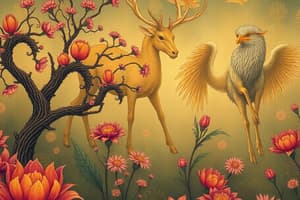Podcast
Questions and Answers
What defines a biological species?
What defines a biological species?
- Any collection of organisms that share similar traits.
- A group that can survive in diverse habitats.
- A group of organisms that can adapt to environmental changes.
- Populations that can breed and produce viable offspring. (correct)
What is the primary difference between transformation and divergence in speciation?
What is the primary difference between transformation and divergence in speciation?
- Transformation occurs slowly over time, while divergence happens quickly.
- Transformation replaces the original species, while divergence creates one or more species from a parent species. (correct)
- Transformation involves reproduction, while divergence does not.
- Transformation leads to geographical isolation, while divergence occurs due to biological barriers.
Which factor is essential for geographical barriers to lead to speciation?
Which factor is essential for geographical barriers to lead to speciation?
- They need to be permanent and unchanging.
- They must occur among species with similar reproductive cycles.
- They must restrict food and resource availability.
- They only need to be present long enough for speciation to occur. (correct)
Which of the following is an example of reproductive isolation due to biological barriers?
Which of the following is an example of reproductive isolation due to biological barriers?
What is adaptive radiation?
What is adaptive radiation?
How can populations become reproductively isolated within the range of a parent population?
How can populations become reproductively isolated within the range of a parent population?
What does gradualism imply in evolutionary theory?
What does gradualism imply in evolutionary theory?
Which of these represents an example of a geographical barrier?
Which of these represents an example of a geographical barrier?
Flashcards are hidden until you start studying
Study Notes
How Species Form
- Biological species are groups that can breed and produce fertile offspring in nature.
- Reproductive isolation prevents dissimilar species from mating.
- Populations breeding at different times are also reproductively isolated.
Forming New Species
- Speciation is the process of creating a new species.
- Transformation is the replacement of an original species with an altered one.
- Divergence is the creation of new species from a single parent species, resulting in increased biodiversity.
Isolation of Populations
- Geographical barriers, such as bodies of water, physically separate populations, leading to reproductive isolation.
- Biological barriers include differences in niches and breeding times, even within the same range.
Speciation in Reproductively Isolated Populations
- When populations become reproductively isolated, speciation has occurred.
- Isolation can occur within a parent population's geographical range if offspring use different resources than their parents.
Adaptive Radiation
- Adaptive radiation describes the diversification of a common ancestor into various adapted species.
- Darwin's finches are an example of adaptive radiation.
Why Adaptive Radiation Occurs
- The process of natural selection favors adaptations that exploit specific resources within an environment.
- The diversity of resources leads to a diversity of traits within a population.
- Over time, this diversification can lead to new species forming.
Studying That Suits You
Use AI to generate personalized quizzes and flashcards to suit your learning preferences.




